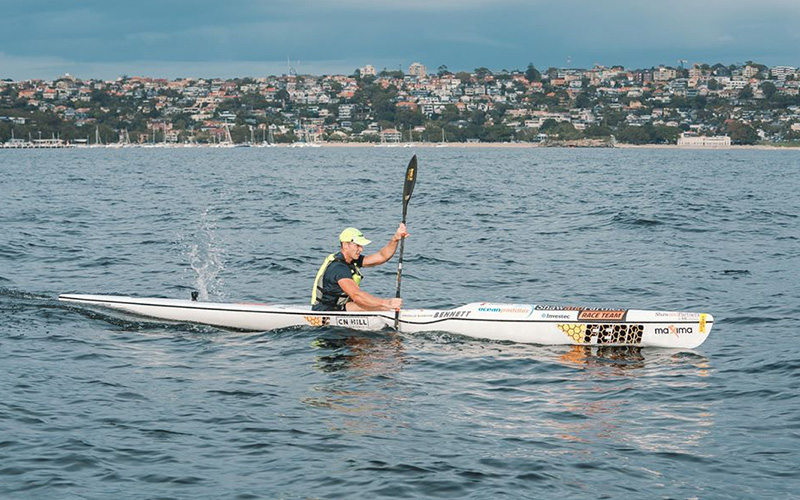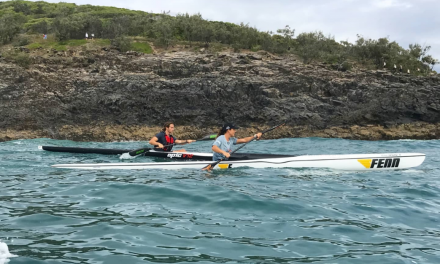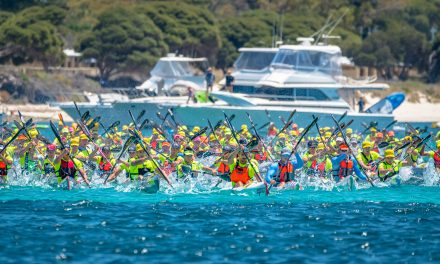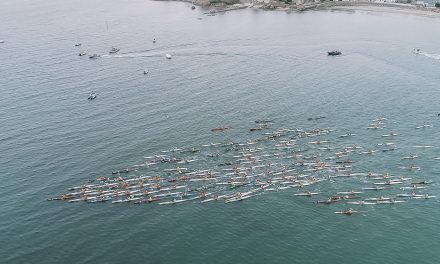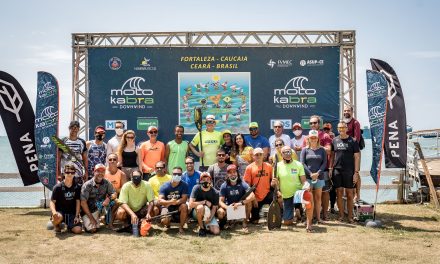THE SECRET SURGERY THAT ALMOST DERAILED NORTON’S YEAR
For Tom Norton, the hardest part of winning may actually be the publicity that comes afterwards.
“To be honest, I don’t enjoy it,” he laughs.
“Yeah, I don’t love it.”
The Tasmanian prodigy is unquestionably humble, if not unashamedly shy. Which goes a long way to explaining why nobody has heard about the shock surgery that almost derailed his 2019 season until now. To anyone else, it’s put down as a freak injury. But to Tom, it’s simply an excuse.
“I like to keep those things to myself,” Norton reveals. “You don’t want to give the opposition a mental advantage, but more so you don’t want to give yourself an excuse.”
To truly understand the enormity of the challenge he faced – and subsequently overcame – you first need to recognise the lofty heights from which he came crashing down.
Buoyed by a string of impressive performances across the 2018 domestic season and motivated after being overlooked for the national sprint kayak team, the now 26 year-old was determined to take his ocean ski paddling to a new level. And Portugal’s iconic Nelo Summer Challenge was the perfect place to start.
“Georgia [Laird, his partner] was going, and I decided that was the next best thing to keep training for,” he recalls.
“I expected myself to do well, but not as well as I did.”
Racing without pressure, and driven by a passion for the sport, Norton recorded the biggest win of his career. In hot, flat conditions he claimed victory 20 seconds ahead of German powerhouse Gordan Harbrecht and one of the surfski’s biggest names, Sean Rice, in third.
“I know everyone has their day – and that was my day – but any time you can compare yourself to Sean and Gordan, it’s good for your self-confidence.
“After that race, it all changed. I definitely thought, ‘yep, I have to start being a winner.’”
He also puts the shift in attitude down to the support of mentor Jeremy Cotter. Norton grew up in the small coastal town of Bernie in the north-west of Tasmania. The cold, testing conditions are a world away from the iconic beaches of the Gold Coast, but in 2017 he and partner Georgia made the move to chase his kayaking dream.
And before long, he found himself slugging it out in the surfski with Cotter – the former professional ironman and three-time winner of the 20 Beaches Ocean Classic.
“He’s helped me with that self-confidence, to be a winner,” Norton explains. “Jez is a phenomenal athlete. He’s one of the hardest guys you can train with. He was always in my ear with little comments at training like, ‘Sean would do this’ or ‘Cory would do this.’
“I think he definitely added to that shift, changing my mindset to become a winner.”
With a new-found self-confidence to battle the best in the world, he flew to North America hungry for more success – but unbeknownst to him, that’s where his year began to unravel.
“I raced in Canada [finishing second] thinking I just had a really sore callus on my finger.
“I pushed through and didn’t really think much of it. But when I got to The Gorge, it all just fell to pieces.”
Norton finished 12th. A respectable result in a strong field, but also a far cry from his usual standard of performance. He knew something was wrong.
Back in Australia, a trip to the doctors resulted in a course of antibiotics. But a week later, there was still no improvement. On Georgia’s insistence, he opted for a second opinion.
“I went and saw a specialist and he said, ‘have you eaten today? If not, don’t. You’ll be in surgery tonight.’”
He was held in hospital for the next two days, hooked to an intravenous drip. An infection had travelled through his body and into his hand, talking hold on the stitches inside his finger, left over from a high-school art class mishap from seven years earlier.
He was unable to exercise for two weeks and then endured a further two weeks of no paddling after that, leaving just a fortnight until the ICF World Championships in France – an event where he was being tipped to thrive.
“I just made the decision that I was good to go,” he recalls.
With that, it was settled. He made the trip, not telling a soul about the extraordinary preparation he had endured. And there were no signs to suggest anything different. In a star-studded field, incredibly, Norton finished sixth.
Yet crossing the finish line, he wasn’t truly satisfied.
“Deep down, no,” Norton admits.
“Reflecting on it, I am pretty happy now. It was a good result, but I just wish I could have done better.”
That feeling was only heightened a fortnight later, where after holidaying for two weeks, he was greeted by gruelling conditions at the Irish Coast Paddling Championships and again finished sixth, albeit this time in a smaller field.
“I just had that ‘I want to prove myself’ kind of feeling. It was kind of motivating because I had that time off.
“You get more out of yourself when you want it.”
And so it proved. He finished the season by once again finishing towards the front-end of world-class fields. A stark contrast to the levels of fitness he raced with in France.
After a year like that, Norton could be forgiven for putting his feet up over the festive season. But instead, he did the exact opposite.
“I had a desire to prove myself and get back to where I think I should have been,” he says.
It paid dividends, recording dominant wins at both the Bridge To Beach and the Makai Cup – a race which doubled as the ICF Australian Championships. It was the perfect spring-board into a jam-packed 2020.
That was until COVID-19 flipped the sporting world on its head and ground his winning momentum to a halt. Another cruel case of timing, but rather than sulk, his mental fortitude has again come to the fore.
“You have to decide how you want to look at it. For me, it’s a positive,” he says.
“This period of no races is allowing us to set up the perfect plan. I know it’s unclear now with Worlds and what will be our first race, but it excites me to come up a plan I think will work.
“I don’t think anyone has the perfect plan to prepare for an ocean ski race. I’ve come from so many different disciplines now – surf and kayaking all with different squads. Now is the time I can decide what I’ll take from each and decide what works.
“It’s an opportunity to start from scratch and get everything right – gym work, aerobic blocks – and just try and nail it.”
It’s a refreshing outlook that is likely to produce plenty more winning performances. And unfortunately for Tom, that means plenty more interviews.

